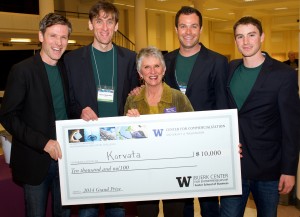Better batteries, recycled building materials, and smart diapers: Environmental Innovation Challenge 2015
How do you foster innovation to address pressing environmental issues? Get college students engaged! The Alaska Airlines Environmental Innovation Challenge at the University of Washington taps into the passion, smarts, and motivation that students have for solving environmental problems. Since its outset, the EIC has attracted 726 students (161 teams) and awarded over $180,000 in prize money.
 A record 40 student teams from colleges and universities across the pacific northwest applied to the this year’s Alaska Airlines Environmental Innovation Challenge. Each team that applies must define an environmental problem, design a solution, and develop a prototype. This year 22 teams were selected to show their prototypes and pitch to 250+ judges at a demo-day event on April 2, 2015.
A record 40 student teams from colleges and universities across the pacific northwest applied to the this year’s Alaska Airlines Environmental Innovation Challenge. Each team that applies must define an environmental problem, design a solution, and develop a prototype. This year 22 teams were selected to show their prototypes and pitch to 250+ judges at a demo-day event on April 2, 2015.
Meet the 22 teams competing in the 2015 Alaska Airlines Environmental Innovation Challenge:
Benchmark ECR
(University of Washington, Washington State University)
Benchmark Environmental is developing an affordable, easy to install, and low maintenance stormwater treatment system. The Benchmark ECR will enable more companies and municipalities to effectively treat every pollutant present in stormwater runoff.
Bettery
(University of Washington)
Bettery provides a better model for battery use: a reusable subscription service that gives consumers unlimited access to reusable batteries with a monthly subscription.
BrightBike
(University of Washington)
The BrightBike has a revolutionary set of features, including electric assist, cargo capacity, a strong and lightweight composite frame, a rain cover, and a complete light system, that make it an irresistible alternative to driving.
Community Supported Bio
(BGI at Pinchot University)
Community Supported Bio (CSB) closes the loop for the farm-to-table movement by turning food waste into renewable biogoods: organic fertilizer & fuel. CSB helps decrease emissions and lower air & water pollution, all while improving soil fertility for farmers.
EcoStream
(University of Washington)
EcoStream builds awareness and lifelong habits to conserve our most valuable resource by helping people conserve water and change their usage habits in a fun and inexpensive way.
Estufa Bella Company
(Seattle Pacific University, Seattle University)
Estufa Bella Company designs and manufactures clean-burning, biochar-producing cook-stoves for use by an estimated 2.7 billion individuals who use traditional wood fires for household cooking and heating.
Extrusion Electronics
(University of Washington)
Extrusion Electronics is reimagining 3D printing with a conductive plastic filament, enabling makers to create and replicate simple electronics at home.
FireBee
(University of Washington)
FireBee is a portable thermoelectric generator that turns cooking fires into personal power stations, creating an alternative energy source for people in countries that are otherwise off the grid.
Flexolar
(University of Washington)
Flexolar, a flexible and lightweight polymer-based solar cell, is an alternative to inorganic solar cells that are heavy, fragile, and costly to manufacture and install.
GeoPop CCS
(University of Washington)
GeoPop turns used plastic bottles collected from the trash into affordable geocells for use in constructing retaining walls, stabilized slopes, platforms, stairs, and pathways in urban slums.
Helio
(University of Washington)
Helio manufactures portable solar panel chargers designed to generate enough power to charge laptops and other electronic accessories.Transmitting energy from the sun eliminates the need for extra batteries and reducing the toxic pollution associated with them.
Hook
(University of Washington)
Hook is a home automation hub that allows customers to convert existing electronics to smart devices, decreasing energy consumption, improving home safety, and reducing the amount of electronics that are routinely discarded in landfills.
Illuminant Diagnostics
(University of Washington)
Illuminant Diagnostics has developed a biosensor empowered by nanotechnology that provides rapid, mobile bacteria detection without the need for cell cultures, traditional DNA testing, or isolation of disease-specific antibodies.
Ion Informatics
(University of Washington)
Ion Informatics is developing a proprietary technology that provides critical information to battery operators, optimizing asset utilization and prolonging the useful life of the battery. The end effect is a dramatic increase in value that can be extracted from each battery by enabling viable second use battery systems.
MarineSitu
(University of Washington)
MarineSitu provides environmental monitoring solutions that facilitate the sustainable development of marine renewable energy.
PowerNode
(University of Washington)
PowerNode is a web-based industrial energy monitoring system that enables users to monitor machine-specific power consumption.
Protium Innovations
(Washington State University)
Protium Innovations is developing a solid state hydrogen liquefaction device that is scalable and more energy efficient than current liquefaction technology.
Silicar9
(University of Washington)
Silicar9 is producing a new low-cost disposable protein purification system that uses more environmentally friendly materials than existing technology.
SmartyPants
(University of Washington)
SmartyPants is reinventing toilet training—and aims to prevent millions of diapers from ending up as a biohazard in landfills across the country—by predicting impending bowel events and alerts users to get to a toilet.
SwitchPoint Solutions
(Central Washington University)
SwitchPoint Solutions’ pilot product, the Solar Evaporative Air Conditioning Handler (SEARCH) is capable of achieving HVAC efficiency gains of over 40%, offering cost savings necessary to incentivize investment in renewable methods of heating and cooling.
Tape-It-Easy
(Seattle University, University of Washington)
Tape-It-Easy is increasing the adoption of water-efficient drip irrigation with a hand-driven, inexpensive tool that dispenses and secures drip tape for faster and easier installation.
TrashWall
(Washington State University)
TrashWall uses recycled materials scavenged from waste streams to build insulation panels that can be installed in rental units to reduce energy waste and increase cost-savings for renters.

